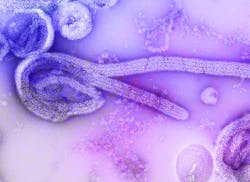WHO makes new recommendations for Ebola treatments, calls for improved access
The World Health Organization (WHO) has published its first guideline for Ebola virus disease therapeutics, with new strong recommendations for the use of two monoclonal antibodies. WHO calls on the global community to increase access to these lifesaving medicines.
Ebola is a severe and too often fatal illness caused by the Ebola virus. Previous Ebola outbreaks and responses have shown that early diagnosis and treatment with optimized supportive care —with fluid and electrolyte repletion and treatment of symptoms—significantly improve survival. Now, following a systematic review and meta-analysis of randomized clinical trials of therapeutics for the disease, WHO has made strong recommendations for two monoclonal antibody treatments: mAb114 (Ansuvimab; Ebanga) and REGN-EB3 (Inmazeb).
Developed according to WHO standards and methods for guidelines, and published simultaneously in English and French, the guidelines will support healthcare providers caring for patients with Ebola, and policymakers involved in outbreak preparedness and response. The clinical trials were conducted during Ebola outbreaks, with the largest trial conducted in the Democratic Republic of the Congo, demonstrating that the highest level of scientific rigour can be applied even during Ebola outbreaks in difficult contexts.
The new guidance complements clinical care guidance that outlines the optimized supportive care Ebola patients should receive, from the relevant tests to administer, to managing pain, nutrition and co-infections, and other approaches that put the patient on the best path to recovery.

